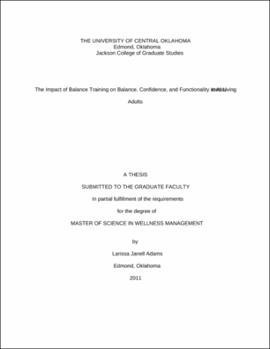| dc.contributor.advisor | Powers, Melissa | |
| dc.contributor.author | Adams, Larissa J | |
| dc.date.accessioned | 2020-05-26T20:37:32Z | |
| dc.date.available | 2020-05-26T20:37:32Z | |
| dc.date.issued | 2011 | |
| dc.identifier.other | (AlmaMMSId)9978541285202196 | |
| dc.identifier.uri | https://hdl.handle.net/11244/324665 | |
| dc.description.abstract | Assisted living adults are at a great risk for falls, which can negatively impact their life. Confidence may be related to balance, as older adults may discontinue physical activity due to a fear of falling. Balance training may mitigate the prevalence of falls and increase confidence. The purpose of this study was to determine the effects of a balance training program on balance, confidence, and functionality in assisted living older adults. Recruiting was done at two different retirement communities. The control group (n=4) was conducted at one facility. Participants completed stretches for each muscle group on an ergonomic disk 45 minutes a day, twice a week for eight weeks. The intervention group (n=5) completed a warm-up, strength training for the upper and lower body, balance training and a cool down for 45 minutes. The Berg Balance Scale (BBS) and 8-foot-up-and-go (UPGO) were used to measure balance. The KATZ ADL and chair stand (CS) were utilized to measure functionality. The Modified Falls Efficacy Scale (MFES) and Balance Efficacy Scale (BES) examined confidence. A repeated measures ANOVA was conducted to analyze results. The intervention group experienced a significant improvement in balance on the BBS (p=.006) from 40??3.39 points to 47.6??2.88 points. No other significant improvements were seen. However, large effect sizes were seen in the control group on the BES (d=1.026), UPGO (d=1.301), and MFES(d=.088). The intervention group possessed large effect sizes on the BBS (d=2.24) and moderate effect sizes on the MFES (d=0.51) and CS (d=0.46). Researchers concluded that confidence may be improved by any increase in physical activity, but a balance training program may be most effective in improving balance. Future research should focus on a comparison of groups participating in no physical activity and those doing a comprehensive program to include walking, strength training, and balance. | |
| dc.rights | All rights reserved by the author, who has granted UCO Chambers Library the non-exclusive right to share this material in its online repositories. Contact UCO Chambers Library's Digital Initiatives Working Group at diwg@uco.edu for the permission policy on the use, reproduction or distribution of this material. | |
| dc.subject.lcsh | Equilibrium (Physiology) | |
| dc.subject.lcsh | Exercise for older people | |
| dc.subject.lcsh | Exercise therapy | |
| dc.title | The impact of balance training on balance, confidence, and functionality in assisted living adults. | |
| dc.type | Academic theses | |
| dc.contributor.committeeMember | Bertram, Glee | |
| dc.contributor.committeeMember | Fent, Darla | |
| dc.thesis.degree | M.S., Wellness Management | |
| dc.identifier.oclc | (OCoLC)ocn840609046 | |
| uco.group | UCO - Graduate Works and Theses::UCO - Theses | |
| thesis.degree.grantor | Jackson College of Graduate Studies | |
